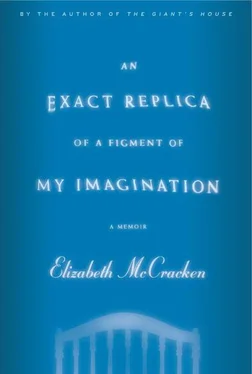And I thought what a good man he was, that he was so understanding, because, and this made me weep harder, because I knew, I knew, that this was all my fault. My essential reaction was grief, but somehow the words that floated to the surface of my brain were: people are going to be mad at me .
Then the male midwife’s head floated away from his body like a balloon and traveled up my torso. It said, “Ce n’est pas ta faute!”
It’s not your fault.
It was my fault.
Edward turned to the doctor. “Et maintenant?” he asked.
The doctor shrugged, and spoke his second two words.
He said, “Le travail.”
The work.
I would have to go through labor. I knew that already, the minute the doctor had shaken his head and said Non . The baby was dead, but he still had to be born. I knew this because my friend Wendy’s sister had lost two late-term children to placenta previa. Before Wendy explained it, stillbirth to me was what happened in black-and-white engravings, in iron beds with nearby pitchers, and it was always a grim surprise. The baby was born. The attending physician shook his head. When Wendy explained it to me, I was shocked. I don’t know how I supposed you got a late-term baby out.
“That’s the worst thing in the world,” I said to Wendy when she told me about her sister.
Now I understand. Of course it wasn’t the worst thing in the world. The worst thing in the world had already happened. He was dead. Everything else was easy.
I leaned on Edward. On the other side of the door was a waiting room full of pregnant women and their partners. On my side of the door, I thought, Don’t catch anyone’s eye .
I was not in shock. I was certainly not in denial. I was thinking quite clearly. I could remember what it was like to be pregnant and hopeful. That was minutes ago, though already in the remotest past. I had been shot out of a cannon since then, I was gone, but I knew: the women outside didn’t deserve to see me, but they would. I had been hustled past them; I had disappeared and wailed; whenever a door opens into a waiting room, all eyes go to see who’s behind it. In this case, me, the intact ruin. From the neck down I looked, like any heavily pregnant woman, like a monument to life. I knew where I was and what I was: bad luck for any pregnant woman to see. I was thirteen black cats. I was all the spilled salt in the world, a thousand smashed mirrors —
No. I was a dropped and dropping mirror. Look at me and see your reflection, for one clear instant before the disaster.
I unfocused my eyes and leaned harder on Edward and let him take me through the waiting room, past the lilacs, and back to the hospital proper.
The little midwife asked if I wanted a tranquilizer. Yes, please. He went running out of the room. We never saw him again.
A while later Sylvie, the delivering midwife, appeared in the room, and said —
Edward and I disagree about what she said. In a little while she would do something we couldn’t forgive her for, but at that moment I still loved her. Even now, I don’t hate her with the hot passion that Edward does, though I don’t remember her with fondness. At any rate: I might in my confusion and sorrow have misheard her; Edward, in his sorrow and anger, might misremember. Everything, of course, is shrouded by our lack of fluency, since she spoke only French.
I thought she said, Elizabeth, what has happened to your baby?
Edward remembers, Elizabeth, what have you done to your baby?
I burst into tears.
You may add that detail into the description of the next five days approximately every four sentences. I burst into tears. I got up. I pulled on my robe. I began to feel around in the dark. What do you need, what can I do? Edward asked me. I burst into tears.
Et cetera.
She hugged me as I cried, and whatever the question was, she asked again, and I loved her. It was so early on, but here was another angle on my grief, and I was glad to get it. She had known Pudding in her way. She had listened to his heartbeat and pronounced it excellent; she had mapped its accelerations and decelerations. Now she said my name over and over, in the French way, Eeliza- bett, Eeliza- bett, and she seemed to understand that her hugging me made me cry harder, and that making me cry harder was something I’d be grateful for. The little male midwife had disappeared; the stern sonographer was back investigating the pregnancies of the lucky. Sylvie was here. She would help us get through all the very terrible things that came next.
Let’s go get some air, she said, and we went outside.
The hospital we were at was small, one floor, with the aforementioned lilacs. It was decided that we would go to a different, larger hospital for le travail . Sylvie called the doctor who’d administered the sonogram the week before, and he drove over. Five days ago he’d spoken only a little English; suddenly, standing in the parking lot, he seemed fluent, sad but professional. We stood among the cars. He and Sylvie spoke in French and shrugged.
“You must see the baby,” he advised us. It was the only medical advice he had left to give. “After he’s born. You must see so you can understand, This is my baby, he is not a monster. This is very important.”
We nodded. So did Sylvie. She said, “Très important. You muss.”
“Yes,” I said.
I didn’t want to see the baby.
This was garden-variety fear, though I didn’t understand that then. All I wanted was to be on the other side of what was about to happen. Not just on the other side of the next few days, the hospital stay, the terror of the delivery (a parody of the childbirth we’d been planning for and anxious about), calling people (another parody of something we were supposed to do; I was waiting until both of my parents would be home to call with the terrible news), getting the hell out of France. The movers were due to pick up our things and take them to England, and if I could have had any wish granted at that moment — besides the obvious, of course, that the sonograph was wrong, the pregnancy was as uncomplicated as it had seemed to be all along, Pudding was alive and would be born and squalling and confounding us within hours — it would have been to be put under anesthesia, the delivery to be done with. Then the movers could pack me in a crate and send me to England. Maybe by September it would be safe to take the crowbar to the wood and part the excelsior and let me back into the world.
Instead, we got in our car and followed Sylvie to the next place.
The new hospital was a grim collection of urban buildings set about with construction cranes. It was the main hospital in Bordeaux, and the construction made it difficult to find our way into the building. We went to an admitting room. I sat on a table. We met a sympathetic young doctor, and then a strange young anesthesiologist who spoke very good English and seemed delighted to practice it despite the circumstances. I would take the epidural after all. A nurse came around with a clipboard, and we ran into the usual confusion over names. McCracken struck most French medical professionals as unthinkable — so many unwieldy consonants! — and besides, I was married, I said I was married, here was my husband, what was his name?
The nurse said, From now on, here, you are Mrs. Harvey.
I saw on my records a note from the morning, handwritten by Claudelle. It said that I was très inquiète, very worried, as though this were a medical diagnosis.
Sylvie came into the room, her cell phone ringing in her hand. She answered it.
“Ah, Claudelle,” she said. “Le bébé est décédé. Oui. Oui. Le bébé est décédé.”
Читать дальше












